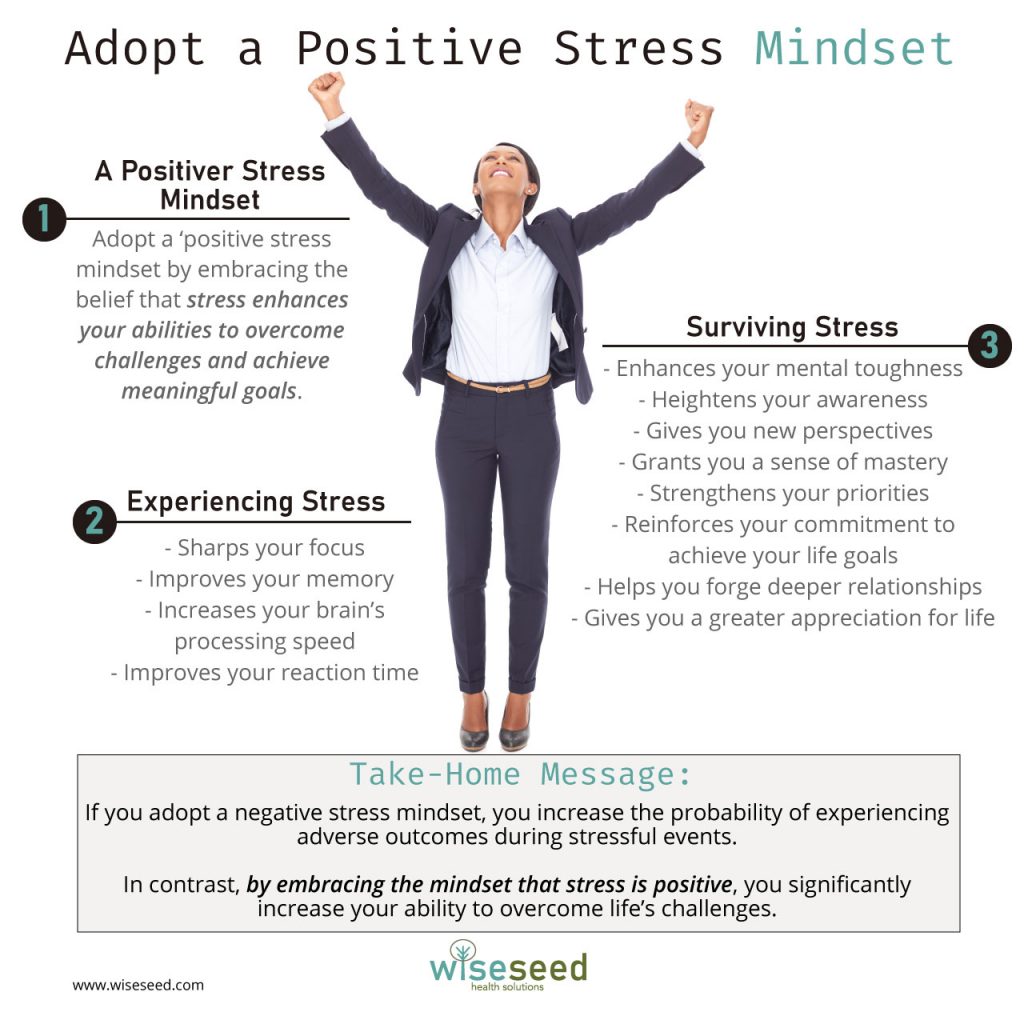How to Become Stress-Proof: Develop a Positive Stress Mindset

‘Embrace the suck’: To consciously accept or appreciate something extremely unpleasant but unavoidable.
Life can be complex, chaotic, and stressful.
Is stress fun? Certainly not.
Instead, the unpleasant nature of stress, which usually entails feelings of fear, anxiety, and dread, is almost universally considered a negative experience.
However, if you want to become the kind of person who thrives in the face of adversity, consider changing how you think about stress and ‘embrace the suck.’
What is Stress?
Humans are goal-orientated beings.
And being human, you progress through life by pursuing and achieving various life goals, spanning your career, family, and social domains.
Stress occurs when you anticipate experiencing setbacks with severe consequences (e.g., embarrassment and social humiliation, physical harm, financial loss, or damage to your career). Familiar examples include sitting exams, undergoing job interviews, meeting critical deadlines, and performing under pressure.
Why Stress Sucks
In modern life, stress has a bad reputation. And for a good reason.
Long-term stress contributes to early death (in the forms of heart disease, accidents, cancer, liver disease, lung ailments, suicide), cognitive impairment, depression, aggression, and relational breakdown (1)!
Thus, it’s rational and understandable that most people view stress as harmful.
The Upside of Stress
And yet, if experiencing stress was all bad, natural selection would have removed the stress response from the gene pool long ago.
However, because most people keenly experience stress, it is clear that evolution has maintained a strong stress response in humans. Indeed, a robust stress response is essential for survival because it sharpens your physical and mental abilities during danger and hardship.
For instance, the unpleasant nature of stress motivates you to take the initiative and overcome complex challenges (1). At the same time, stress enhances your proactive problem-solving capacity by prompting you to anticipate and plan for potential challenges (1). Furthermore, stress narrows your perspective, giving you superhuman focus (1). Finally, the hormones released during stress boost your memory and increase your cognitive power (1).
Thus, while your stress response may feel unpleasant, it enhances your physical, mental, and psychological performance when you need it most.
Mindsets
We live in a complex world, which far exceeds our limited cognition. To counter complexity, humans rely on simplified models of reality called ‘mindsets’ that use a few key pieces of information to guide decision-making and action (2).
Because mindsets directly link objective reality and your capacity to act, the mindsets you adopt profoundly impact your quality of life.
Negative mindsets are more likely to produce adverse outcomes. For example, people who adopt a negative mindset towards aging die sooner than those with a positive-aging mindset (3).
In contrast, adopting a positive mindset stacks the deck in favor of achieving positive outcomes. For example, students who believe that they can increase their intelligence (4) experience:
- a greater appreciation of knowledge and expertise
- increased effort and motivation
- improved GPAs, and
- enhanced enjoyment of learning.
These and many other examples show how your mindset choice impacts your life.
Therefore, you should choose your mindsets wisely!
Adopting a Positive Stress Mindset
You have two options when considering your stress mindset. The first is the default option to adopt a ‘negative stress mindset,’ where you consider stress debilitating, harmful, and best avoided.
Alternatively, you can adopt a ‘ positive stress mindset’ by embracing the belief that stress enhances your abilities to overcome challenges and achieve meaningful goals.
I argue that you should adopt a positive stress mindset for two reasons.
First, adopting a negative stress mindset encourages you to avoid and minimize stress. Thus, assuming a negative stress mindset discourages you from pursuing challenging goals that support your long-term well-being (1).
Second, adopting a positive stress mindset improves your chance of success (1).
Evidence that Adopting a Positive Stress Mindset Works.
You are more likely to experience better psychological health and higher productivity if you adopt a positive stress mindset (1). Moreover, people who view stress as positive are far more likely to seek feedback (1), critical for optimal performance under uncertain and rapidly changing conditions.
For example, selection for military special forces is grueling and highly stressful. Yet, strikingly, under these extreme conditions, Navy seal recruits with a positive stress mindset are more likely to (i) persist through training, (ii) perform better on obstacle courses, and (iii) receive fewer negative evaluations from instructors (5).
Finally, students who embody a positive stress mindset enjoy better psychological and physical health under stressful conditions (6).
How to Develop a Positive Stress Mindset
While building a stress mindset is simple, it does require conscious effort.
First, remember that your stress response is a gift from your ancestors who survived tribal warfare, were hunted by wild animals, and faced extreme hardship and deprivation.
Then, before and during stressful situations, recall that stress makes you powerful by:
- Sharpening your focus
- Improving your memory
- Increasing your brain’s processing speed
- Improving your reaction time
And finally, acknowledge that surviving stress:
- Enhances your mental toughness
- Heightens your awareness
- Gives you new perspectives about yourself and your life
- Grants you a sense of mastery
- Strengthens priorities and reinforces your commitment to your life goals
- Helps you forge deeper relationships
- Gives you a greater appreciation for life
In short, acknowledge that stress makes you more powerful and enhances your life.
Take-Home Message
Experiencing stress is inevitable, especially when pursuing challenging and meaningful goals. Alas, most people view stress as a negative experience best avoided or, at worst, endured.
However, if you adopt a stress-is-bad mindset, you increase the probability of experiencing adverse outcomes during stressful events.
Fortunately, however, your stress response is part of your genetic endowment that helped your ancestors survive extreme hardship and adversity.
Thus, by embracing the mindset that stress is positive and empowering, you significantly increase your ability to overcome life’s challenges and achieve your goals.

References and Further Reading
1. A. J. Crum, P. Salovey, S. Achor, Rethinking stress: the role of mindsets in determining the stress response. J Pers Soc Psychol 104, 716-733 (2013).
2. S. E. Taylor, Schematic bases of social information processing. Social Cognition, 89-134 (1981).
3. C. Tully-Wilson et al., Self-perceptions of aging: A systematic review of longitudinal studies. Psychol Aging 36, 773-789 (2021).
4. L. S. Blackwell, K. H. Trzesniewski, C. S. Dweck, Implicit theories of intelligence predict achievement across an adolescent transition: a longitudinal study and an intervention. Child Dev 78, 246-263 (2007).
5. E. N. Smith, M. D. Young, A. J. Crum, Stress, Mindsets, and Success in Navy SEALs Special Warfare Training. Front Psychol 10, 2962 (2019).
6. A. Jenkins, M. S. Weeks, B. M. Hard, General and specific stress mindsets: Links with college student health and academic performance. PLoS One 16, e0256351 (2021).
Acknowledgements
Images created by RuslanDashinsky and Nadezhda Tonkova
Disclaimer
The material displayed on this website is provided without any guarantees, conditions or warranties as to its accuracy.
Information written and expressed on this website is for education purposes and interest only. It is not intended to replace advice from your medical or healthcare professional.
You are encouraged to make your own health care choices based on your own research and in conjunction with your qualified practitioner.
The information provided on this website is not intended to provide a diagnosis, treatment or cure for any diseases. You should seek medical attention before undertaking any diet, exercise, other health program or other procedure described on this website.
To the fullest extent permitted by law we hereby expressly exclude all warranties and other terms which might otherwise be implied by statute, common law or the law of equity and must not be liable for any damages whatsoever, including but without limitation to any direct, indirect, special, consequential, punitive or incidental damages, or damages for loss of use, profits, data or other intangibles, damage to goodwill or reputation, injury or death, or the cost of procurement of substitute goods and services, arising out of or related to the use, inability to use, performance or failures of this website or any linked sites and any materials or information posted on those sites, irrespective of whether such damages were foreseeable or arise in contract, tort, equity, restitution, by statute, at common law or otherwise.

Ten Minutes is All You Need
Research has shown that ten minutes of moderate-to-vigorous exercise performed each day is enough to significantly reduce your risk of early death.





